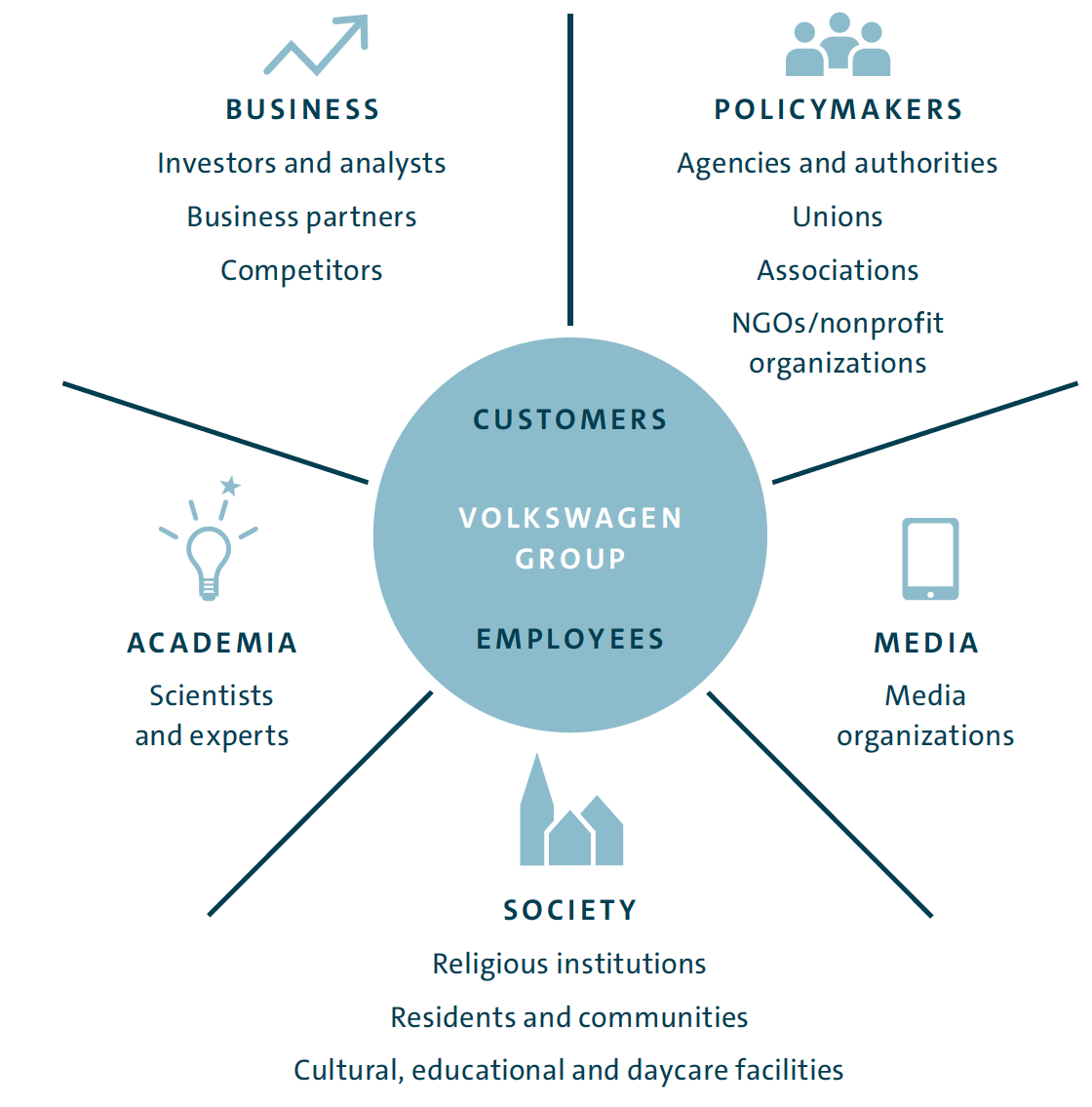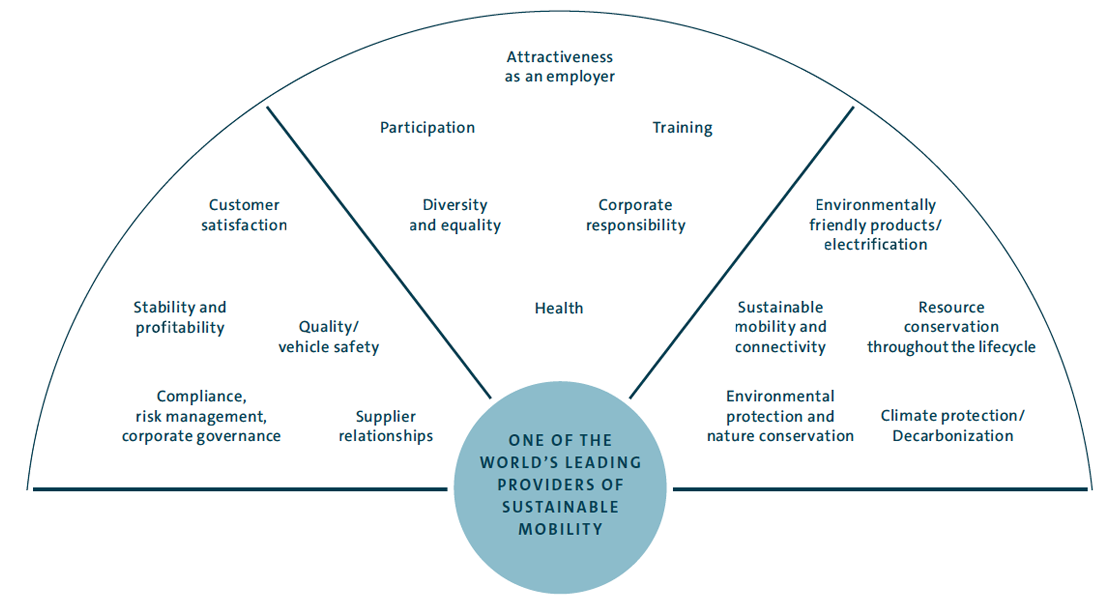Sustainability
The Volkswagen Group is committed to sustainable, transparent and responsible corporate governance. The biggest challenge we face in implementing this at all levels and at every step in the value chain is the complexity of our Company, with its twelve brands, more than 626 thousand employees and 120 production locations. In order to tackle this challenge in the best way possible, we follow the recommendations of the German Corporate Governance Code and coordinate our sustainability activities across the entire Group. We have also put in place a forward-looking system of risk management and a clear framework for dealing with environmental issues in a future-oriented manner, employee responsibility and social commitment across our brands and in the regions in which we operate. The remuneration paid to the Group Board of Management also takes the Company’s long-term success into account.
For us, sustainability means simultaneously striving for economic, social and environmental goals in a way that gives them equal priority. We want to create enduring value, provide good working conditions and handle the environment and resources with care. In connection with the diesel issue, we failed to meet our own standards in several respects. The irregularities in our handling of emissions figures are contrary to everything we stand for. We are doing everything within our power both to prevent it happening again and to regain lost trust from our stakeholders. Our sustainability concept is under extensive revision to ensure that we recognize risks and opportunities in the areas of environment, society and governance at an early stage at every step along the value chain. In this way, our corporate social responsibility (CSR) activities will contribute toward enhancing our Company’s reputation and value in the long term.
Management und coordination
The Volkswagen Group has created a clear management structure to coordinate the Group’s activities as regards sustainability and CSR. Its highest committee is the Group Board of Management (Sustainability Board), which is regularly informed by the Group Sustainability steering group on issues related to sustainability and corporate responsibility. The members of the Group Sustainability steering group include executives from central Board of Management business areas and representatives of the Group Works Council and the brands. The steering group’s tasks include identifying the key action areas, making decisions on the strategic sustainability goals, monitoring the extent to which these goals are being met by means of indicators and approving the sustainability report.
The sustainability office supports the steering group. Its duties include coordinating all sustainability activities within the Group and the brands. It is also responsible for stakeholder dialog at Group level, for example with sustainability-driven analysts and investors. In addition, CSR project teams work across business areas on topics such as reporting, stakeholder management and sustainability in supplier
relationships. In parallel, this coordination and working structure is also largely established across the brands and is constantly expanding. Since 2009, the Sustainability & CSR coordinators for all brands and regions have come together once a year to promote communication across the Group, create uniform structures and learn from one another. This Group CSR meeting has proven its worth as an integral part of the Group-wide coordination structure.
Sustainability Council
As part of its efforts to continuously improve and expand its sustainability management, the Volkswagen Group appointed an international Sustainability Council in 2016 made up of renowned experts from the academic world, politics and society. The members of the council establish their own working methods and areas of focus independently and consult with the Board of Management, senior managers and the employee representatives regularly. The council’s role is to keep a watchful, critical eye on developments within the Company and in society.
The proven expertise of the council members guarantees a comprehensive approach. The topics addressed are social responsibility and integrity, sustainable mobility and climate protection, and the future of work and digitalization.
The Sustainability Council is vested with rights of information, consultation and initiative. This involves receiving timely, comprehensive information so that the council can fulfill its consulting mandate. Dialog between the Company and the council is ensured through the active offering of consultations. In addition, the council is authorized to proactively propose topics and it or its members can implement projects with the Company subject to prior agreement.
The first key issues in 2017 will be not only the challenges created by global CO2 emissions and the corresponding regulations to be met post-2025, but also the Company’s transformation process. The Volkswagen Group is initially providing €20 million in funding for projects proposed and promoted by the Sustainability Council in its first two years.
VOLKSWAGEN GROUP’S KEY ACTION AREAS
Materiality analysis
Two developments in 2016 influenced the detailed analysis as to which issues are material to the Volkswagen Group: the realignment of the Group via the future program TOGETHER – Strategy 2025, and dealing with the consequences of the diesel issue.
After analyzing and identifying topics that are material to the Company, we derived 16 key action areas that we will use to achieve our goal of becoming one of the world’s leading providers of sustainable mobility. The analysis was based on external studies, industry analyses and stakeholder surveys carried out by our brands, internal guidelines such as our corporate strategy and Group environmental strategy as well as key factors identified by the Volkswagen Group’s strategy committee.
As the details of the new Group strategy have not yet been finalized, we are still in the process of specifying the content of the key action areas and defining corresponding values, targets and indicators. As an enterprise with global operations, we will also take account of the options available to us for influencing and implementing the Sustainable Development Goals (SDGs) formulated by the United Nations.
Code of Conduct and guidelines
Voluntary commitments and principles that apply throughout the Group form the backbone of our strategic sustainability goals. Such principles include the seven Volkswagen Group values, namely customer focus, top performance, value creation, the ability to realign, respect, responsibility and sustainability. In addition, our sustainability model provides the framework for sustainable and responsible action. The Code of Conduct introduced by the Volkswagen Group in 2010 also applies to the entire Group and helps managers and employees alike to deal with legal and ethical challenges in their day-to-day work.
We expressly support the United Nations Global Compact, an agreement between the UN and the business world aimed at enhancing the social and ecological aspects of globalization. As long ago as 2002, the Volkswagen Group made a commitment to promoting human rights, labor standards and environmental protection and combating corruption. In 2013, this commitment was extended to include the CEO Water Mandate, the aim of which is to ensure the careful management of water resources. Until such time as the diesel issue has been finally resolved, we have agreed to put our membership on hold. We ensure that our actions are in line with the declarations of the International Labor Organization (ILO), the principles and conventions of the Organisation for Economic Co-operation and Development (OECD) and the international covenants of the United Nations on basic rights and freedom.
We have also established our own internal guidelines in the shape of the Volkswagen Social Charter, the Charter on Labor Relations, the Charter on Vocational Education and Training, and the Charter on Temporary Work, all of which apply to the Group as a whole. Environmental protection activities are shaped by the environmental policy and principles for products and production, which both apply throughout the Group.
Strategic stakeholder management
Every day, we are confronted by the multifarious demands, expectations and attitudes of our many different stakeholders. These stakeholders may be individuals, groups or organizations with a legitimate interest in how the Volkswagen Group reaches its corporate decisions and in the implications of those decisions. Our customers and our employees are our key stakeholders. They form the core around which twelve other stakeholder groups are positioned – from the business and academic worlds, society and politics, and the media. The relationships our companies entertain with their stakeholders enrich the work we do together. At the same time, the diverse interests of these groups can lead to conflicts of interests.
STAKEHOLDERS OF THE VOLKSWAGEN GROUP

That is why, day in and day out, we have to strike a balance between acting efficiently and satisfying a wide array of social expectations. Our customers expect a high-quality range of mobility products and first-class service. Performance-related remuneration, secure jobs and co-determination are key issues for our employees. Investors and analysts, on the other hand, want to see constantly rising unit sales and solid earnings growth, whereas civil society stakeholders are focused on social commitment and supporting social and environmental projects.
It is important to us that our stakeholders interact with us as equal partners. We know that we can achieve long-term success only if we take a proactive approach and are fully acquainted with the interests, needs and expectations of our stakeholders. That includes:
- systematically capturing, analyzing and understanding the stakeholders’ expectations of Volkswagen;
- solving problems jointly and sharing and utilizing the knowledge of both sides;
- openly addressing conflicts and recognizing potential conflicts and the risks arising from them; and
- improving the quality of our decisions through transparency, openness and participation.
In addition to actively sharing information, we are also promoting a more in-depth and trust-based form of collaboration with selected stakeholders, the goal being to provide support to society, solve problems jointly and to draw on their expertise in the decision-making process. Examples include our cooperation with the German Red Cross (DRK) and our efforts to help refugees.
Humanity, public spirit and a sense of responsibility are the values on which the work of the DRK is based, and they are values we share. As part of the strategic partnership, the Volkswagen Group helps the DRK to find more people who are willing to volunteer their time. This goal is central to the partnership, in conjunction with strengthening the Red Cross’s rescue service.
The slogan “Helping Together” sums up how we are joining in the collective task of receiving and integrating the refugees who come to Europe and Germany. This is accomplished through a wide variety of projects, such as immediate aid in the initial accommodation facilities, local integration and education projects as well as providing vehicles and nonmonetary resources.
However, our long-standing cooperation and consultancy agreement with the German Nature and Biodiversity Conservation Union (NABU) expired on December 31, 2015. Extension of the contract and further collaboration are suspended for the time being as a result of the diesel issue. Nevertheless, we would like to continue our strategic partnership with NABU and are working hard to create the conditions needed to resume our successful project work of the past.
Not only do we provide support for projects that address future trends or that aid education or society as a whole, but we also want to drive the economy by helping to promote structural development and equal opportunities. In the reporting period we were involved in around 200 projects worldwide. In these, we pay special attention to the continuity and sustainability of our activities. We want not only our employees, but also our shareholders, neighbors and customers to benefit from what we do. Furthermore, we provide rapid assistance to victims of natural disasters and support the volunteer work of our own employees.
